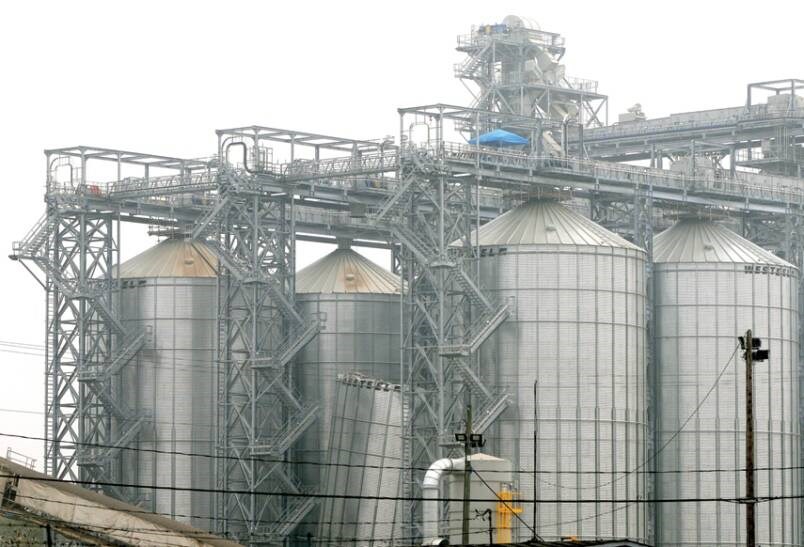Three years after a grain silo collapse on the North Vancouver waterfront triggered a cascade of lawsuits, two of the main parties have agreed to settle out of court. But numerous third-party civil suits stemming from the industrial accident remain a “quagmire,” in the words of the B.C. Supreme Court justice managing the case.
On Sept. 11, 2020, one of Fibreco’s brand new grain silos collapsed during the commissioning phase. All of the new grain silos on the site had to be demolished, redesigned and rebuilt, an Oct. 4 ruling from B.C. Supreme Court notes.
In 2021, Fibreco sued AG Growth International, the company that designed and built the silos, along with its subsidiaries, alleging faulty engineering.
Later that year, Fibreco also sued Marsh Canada, their insurance broker, after the insurers denied them coverage because, they maintained, Fibreco’s policy had expired. AGI joined Fibreco in that suit as a third party.
Fibreco’s main customer and partial funder of the silo project, AGT Food and Ingredients, also sued the waterfront terminal for their losses.
The matter was scheduled to go to a 125-day trial starting in Vancouver this week, however AGI and Fibreco agreed in July that they would settle their claims against each other out of court.
Before the other suits can be heard, however, Fibreco sought a court order making the terms of their settlement confidential and permanently sealing affidavits filed by them. Marsh and AGT opposed the confidentiality order, given their ongoing legal disputes with Fibreco and AGI.
Previously, AGI provided Marsh with a redacted copy of the settlement agreement, which blacked out financial details.
In his Oct. 4, ruling, B.C. Supreme Court Justice David Masuhara acknowledged “the parties find themselves in a quagmire.”
Canadian courts are generally supportive of parties resolving their disputes without the public expense of a trial, and Masuhara acknowledged “settlement privilege” makes it more likely for parties to have successful negotiations if their communications are confidential and not disclosed or used against them.
But the courts must also balance those objectives with the public interest of keeping the court open to the public for scrutiny and, thereby, more accountable, Masuhara noted, and there are exceptions to “settlement privilege” when related third-party suits remain unresolved.
Fibreco and AGI failed to prove that openness poses a serious risk to any important public interest or even commercial interests beyond their own, Masuhara found.
Masuhara agreed with AGT’s arguments that the facts of the incident underlying the lawsuits “implicate the safety and reliability of critical infrastructure that supports the distribution of Canadian agriproducts through the largest port in the country.”
“The silo collapse has already been the subject of some media attention. How Fibreco and AGI – two parties at the heart of the design and construction of the project – have resolved their differences and attributed financial responsibility as between each other is a matter of public interest,” he wrote.
And, Masuhara noted, AGI had already disclosed part of the financial terms of the settlement via a press release in July, which stated “AGI expects to record an additional pre-tax charge of approximately $15.6 million in the second quarter of 2023 in connection with the Fibreco settlement.”
In its quarterly financial disclosure statement the following month, AGI reported that it would have another cash settlement of $55.1 million in the third quarter of 2023, the judge noted.
“Though Fibreco and AGI have not disclosed the financial terms of their settlement, they have already disclosed significant aspects of the settlement agreements to the public. Fibreco cannot say that it has treated the entirety of the settlement agreements – which it now seeks to subject to a sealing order – as confidential,” Masuhara wrote.
The parties were in B.C. Supreme Court in Vancouver on Wednesday for Marsh’s lawyers to make arguments that the original, unredacted copies of the settlement agreement should be disclosed to the other parties in the suit.
Eventually, the insurers ended up covering the costs for two of the silos to be rebuilt, the ruling notes, and the companies continue to negotiate.
None of the original claims have been tested in court.
Fibreco is seeking to have its case against Marsh heard in January 2024. AGT and other parties are looking for trial dates later in the year.





